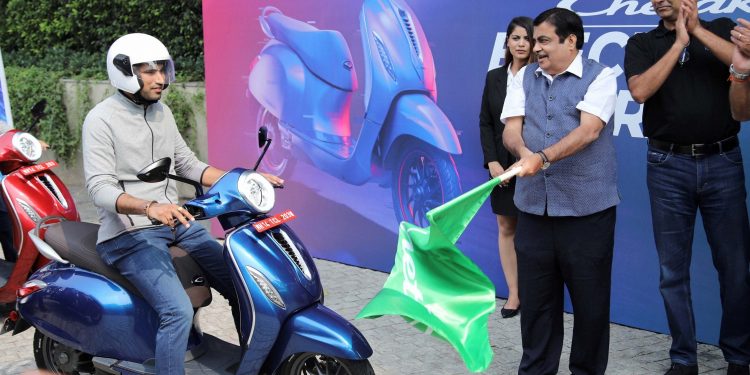New Delhi: Iconic scooter brand of yesteryears, Chetak is making a comeback in an electric avatar with Bajaj Auto announcing Wednesday that it will sell electric scooters under the label as a premium offering.
The company, which had vehemently opposed a proposal of Niti Aayog to go for 100 per cent electric vehicles (EVs) for three-wheelers by 2023 and two-wheelers with an engine capacity less than 150 cc by 2025, said its entry into the EV space is to get the first mover advantage in the segment.
Bajaj Auto said it plans to start selling e-scooter Chetak from January onwards in Pune and then move to Bangalore after gauging the response. Then it will expand operations to other locations.
While unveiling the Chetak e-scooter the company did not disclose the price but said it would not be more than Rs 1,50,000. The vehicle gives a driving range of 95 km on eco mode and 85 km on sports mode on a single charge of around five hours.
The e-scooter was unveiled by Union Road Transport and Highways Minister Nitin Gadkari in presence of Niti Aayog CEO Amitabh Kant and Bajaj Auto MD Rajiv Bajaj.
Explaining why the company has decided to enter the EV space, Rajiv Bajaj cited ‘Alibaba’ chief Jack Ma’s remarks of not waiting for the environment and the policies to be ready because ‘when everything is ready there is no opportunity for you’.
“If you are not the first to the market, at worst second to the market, you lose the market further. It is with this attitude that we decided to move into our ‘kal’ with our electric vehicle,” Bajaj stated.
The top official of the company said that it is entering the EV space with a proven record over the decades as a credible manufacturer of two and three-wheelers unlike others which have entered the space either as start-ups or assemblers.
Launched in the early 1970’s, the ‘Chetak’ scooter had sold over a crore units in hey days. Its waiting period ran into not just months but years and it became a household name with its popular campaign ‘Hamara Bajaj’.
However, at the turn of the millennium, sales of the brand dwindled as the two-wheeler market moved towards motorcycles and the company decided to stop production of the brand in mid-2000s.
PTI







































